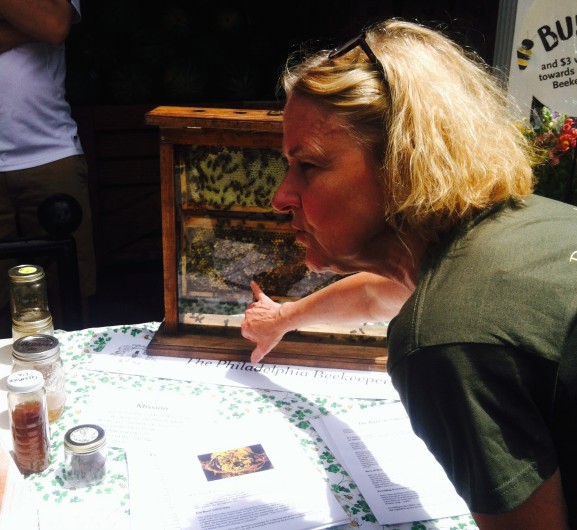
“I am not a bug person,” said Anaiis Salles, resident beekeeper at Green Sanctuary Community Apiary, located on the grounds of the 52-acre Awbury Arboretum.
How, then, did Salles become an authority on beekeeping in the Northwest community? She first dipped her toe in the honeybee activism waters by providing basic information about colony collapse and selling local honey at her church several years ago.

Salles was originally moved to get involved with bees after finding about colony collapse disorder, a phenomenon that has been responsible for an exponential decline of the U.S. honeybee population. Total losses average around 30 percent each year – a rate that Salles says is unsustainable. If these trends continue, honeybees could become extinct as early as 2035, and with them, approximately two out of every three bites of fresh food we currently enjoy will disappear from our plates as well.

When Salles took a beekeeping class so as to have more complete answers to offer visitors to her table, she never anticipated that she would soon start keeping bees of her own.
“I had to overcome a lot of fear,” she said. “The bees are great teachers.”
Since moving past that fear, Salles has dived into bee activism wholeheartedly. In 2013, she was awarded a research grant by the University of Vermont to support her innovative new top bar hive design. Things are going well; all of Salles’s bees made it through this past difficult winter. Salles has also developed a board game to educate young people about the global impact of honeybees.
https://vimeo.com/98951123 w=500 h=281]
Comfortingly, Salles is only one of the most recent characters in Philadelphia’s long and storied history with beekeeping. In 1852, the Langstroth hive was invented by Philadelphia native Reverend Lorenzo Langstroth, whose groundbreaking design allowed for honey to be harvested without destroying the hive- a tool that has since evolved into the basis of much agricultural pollination worldwide.
For this accomplishment, the Philadelphia Beekeepers Guild– a community of more than one hundred beekeepers based in and around Philadelphia- considers the city the cradle of modern beekeeping. The Guild continues Langstroth’s legacy today by generating public awareness of honeybees and providing support for new beekeepers.

“They’re really not very much trouble,” said guild member and backyard beekeeper Deborah Collier as she handed out information to shoppers at Whole Foods Market in Wynnewood on the Main Line.
The international grocery chain has numerous locations throughout Greater Philadelphia and is currently donating $3 from every “Honeybee Bouquet” sold to the Philadelphia Beekeeper’s Guild.

“With that money we will increase awareness and promote more beekeepers in and around the city of Philadelphia,” said Guild president Suzanne Matlock.
Matlock says the Guild hopes to use the funds to provide a hive starter kit to each new person who completes the Guild’s beekeeping course that begins again in February. She also plans to make an observation hive available to each of the three historic hosts of their annual Honey Festival (one of which – the Wyck House – is located in the Germantown).
The festival, which will take place on September 5,6 and 7 this year, features everything from educational talks by beekeeping experts to activities for kids and honey-flavored happy hours for adults- all in the name of building up the community of bee-positive Philadelphians.

“We realize that not everybody wants to be a beekeeper but they are concerned about bees,” said Matlock, who admits approaching beekeeping for the first time can be intimidating.
Luckily, there are a myriad of other ways to help, including planting diverse native flowers, letting clover and dandelions grow freely and abstaining from using pesticides. Don’t even want to get your hands dirty? Buying local raw honey is a great way to let your beekeeping neighbors know that they have your support.

– Text, images, and video by Victoria Marchiony


Be the first to comment